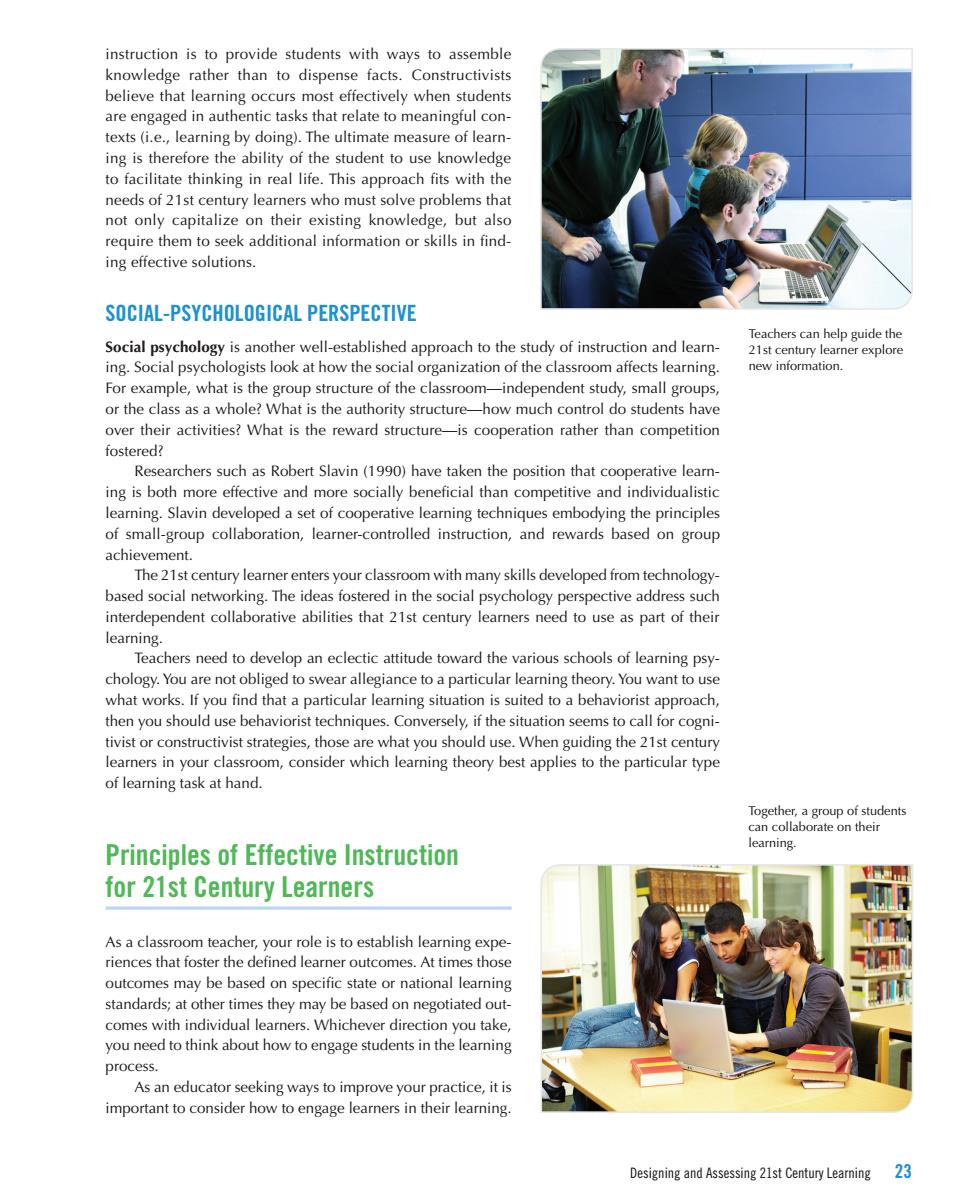正在加载图片...

instruction is to provide students with ways to assemble knowledge rather than to dispense facts.Constructivists believe that learning occurs most effectively when student are engaged in authentic tasks that relate to meaningful con exts (ie..learning by doing).The ultimate measure of learr use knowledg facilitate thinking in real life this vith the eeds of 21st ce ers who ontheir existing but also to seek additional info ing effective soluti SOCIAL-PSYCHOLOGICAL PERSPECTIVE Social psychology is another well-established approach to the study of instruction and lear- 1st ce ury le ing.Social psychologists look at how the social organization of the classroom affects learning. For example,what is the group structure of the classroom-independent study,small groups, or the class as a whole?What is the authority structure-how much control do students have over their activities?What is the reward structure-is cooperation rather than competition fostered? Researchers such as Robert Slavin(1990)have taken the position that cooperative leam- ing is both more effective and more socially beneficial than competitive and individualistic learning.Slavin developed a set of cooperative learning techniques embodying the principles of small-group collaboration,learner-controlled instruction,and rewards based on group achievement The 21st century learner enters your classroom with many skills developed from technology based social networking.The ideas fostered in the social psychology perspective address such interdependent collaborative abilities that 21st century learners need to use as part of their learning Teachers need to develon an eclectic attitude toward the various schools of learning psy chology.You are not obliged to swear allegiance to a particular learning theory.You want to use works.If you find that a particular learning situation is suited to a behaviorist approach then you should use behaviorist techniques.C tivist or ructivist stra gie u should use Whe rs in your clas ing theo ask at hand. app articular type Together,a group of students aborate on thei Principles of Effective Instruction for 21st Century Learners As a classroom teacher,your role is to establish learning expe riences that foster the defined learner outcomes.At times those outcomes may be based on specific state or national learning standards;at other times they may be based on negotiated out- comes with individual leamers.Whichever direction you take, you need to think about how to engage students in the learning process. As an educator seeking ways to improve your practice,it is important to consider how to engage learners in their learning Designing and Assessing 21st Century Leaming Designing and Assessing 21st Century Learning 23 instruction is to provide students with ways to assemble knowledge rather than to dispense facts. Constructivists believe that learning occurs most effectively when students are engaged in authentic tasks that relate to meaningful contexts (i.e., learning by doing). The ultimate measure of learning is therefore the ability of the student to use knowledge to facilitate thinking in real life. This approach fits with the needs of 21st century learners who must solve problems that not only capitalize on their existing knowledge, but also require them to seek additional information or skills in finding effective solutions. Social-Psychological Perspective Social psychology is another well-established approach to the study of instruction and learning. Social psychologists look at how the social organization of the classroom affects learning. For example, what is the group structure of the classroom—independent study, small groups, or the class as a whole? What is the authority structure—how much control do students have over their activities? What is the reward structure— is cooperation rather than competition fostered? Researchers such as Robert Slavin (1990) have taken the position that cooperative learning is both more effective and more socially beneficial than competitive and individualistic learning. Slavin developed a set of cooperative learning techniques embodying the principles of small- group collaboration, learner- controlled instruction, and rewards based on group achievement. The 21st century learner enters your classroom with many skills developed from technologybased social networking. The ideas fostered in the social psychology perspective address such interdependent collaborative abilities that 21st century learners need to use as part of their learning. Teachers need to develop an eclectic attitude toward the various schools of learning psychology. You are not obliged to swear allegiance to a particular learning theory. You want to use what works. If you find that a particular learning situation is suited to a behaviorist approach, then you should use behaviorist techniques. Conversely, if the situation seems to call for cognitivist or constructivist strategies, those are what you should use. When guiding the 21st century learners in your classroom, consider which learning theory best applies to the particular type of learning task at hand. Principles of Effective Instruction for 21st Century Learners As a classroom teacher, your role is to establish learning experiences that foster the defined learner outcomes. At times those outcomes may be based on specific state or national learning standards; at other times they may be based on negotiated outcomes with individual learners. Whichever direction you take, you need to think about how to engage students in the learning process. As an educator seeking ways to improve your practice, it is important to consider how to engage learners in their learning. Teachers can help guide the 21st century learner explore new information. Together, a group of students can collaborate on their learning. M02_SMAL4150_01_SE_C02.indd 23 2/7/14 8:37 AM